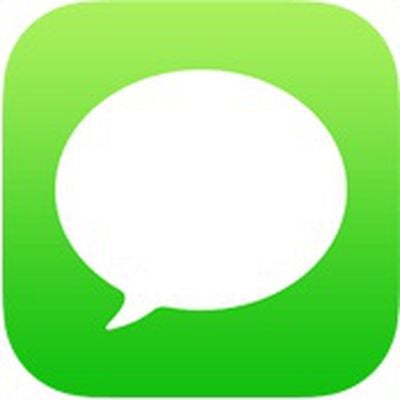Apple Says iMessage Interception Would Require Re-Engineering Systems, Has No Interest in Doing So
 Yesterday, researchers made a presentation at the Hack in the Box conference arguing that Apple's iMessage system could theoretically allow Apple or another party to intercept the encrypted messages. The concern stems in part from Apple's use of a private server for storing users' public keys used to encrypt messages, meaning that senders have no way of knowing whether a potentially false key has been inserted in order to intercept messages intended for a different recipient.
Yesterday, researchers made a presentation at the Hack in the Box conference arguing that Apple's iMessage system could theoretically allow Apple or another party to intercept the encrypted messages. The concern stems in part from Apple's use of a private server for storing users' public keys used to encrypt messages, meaning that senders have no way of knowing whether a potentially false key has been inserted in order to intercept messages intended for a different recipient.
In a statement to AllThingsD, Apple once again denies that it can read iMessages, noting that it would require the service's systems to be re-engineered and that the company has no interest in doing so.
Apple says that QuarksLab’s theory is just that — a theory, and one that would require a rearchitecting of iMessage for it ever to be a threat in the real world.
“iMessage is not architected to allow Apple to read messages,” said Apple spokeswoman Trudy Muller said in a statement to AllThingsD. “The research discussed theoretical vulnerabilities that would require Apple to re-engineer the iMessage system to exploit it, and Apple has no plans or intentions to do so.”
Apple's statement does not actually refute the original claim, simply confirming that as the service is currently configured it is impossible for Apple to intercept iMessages. The researchers' argument rests on the observation that changes could be made to Apple's systems to allow for iMessages to be intercepted without users being aware of the changes.
The result is that Apple is arguing users should trust that the company has no interest in making such changes, and if users take Apple at its word, the researchers' concerns remain merely theoretical. But some users may remained concerned that Apple could be quietly compelled to make changes by government security agencies, compromising Apple's touted "secure end-to-end encryption" for iMessage.
Popular Stories
Despite being more than two years old, Apple's AirPods Pro 2 still dominate the premium wireless‑earbud space, thanks to a potent mix of top‑tier audio, class‑leading noise cancellation, and Apple's habit of delivering major new features through software updates. With AirPods Pro 3 widely expected to arrive in 2025, prospective buyers now face a familiar dilemma: snap up the proven...
Apple plans to release an all-new super thin iPhone this year, debuting it alongside the iPhone 17, iPhone 17 Pro, and iPhone 17 Pro Max. We've seen pictures of dummy models, cases, and renders with the design, but Lewis Hilsenteger of Unbox Therapy today showed off newer dummy models that give us a better idea of just how thin the "iPhone 17 Air" will be.
The iPhone 17 Air is expected to be ...
If you missed the video showing dummy models of Apple's all-new super thin iPhone 17 Air that's expected later this year, Sonny Dickson this morning shared some further images of the device in close alignment with the other dummy models in the iPhone 17 lineup, indicating just how thin it is likely to be in comparison.
The iPhone 17 Air is expected to be around 5.5mm thick – with a thicker ...
A developer has demonstrated Windows 11 ARM running on an M2 iPad Air using emulation, which has become much easier since the EU's Digital Markets Act (DMA) regulations came into effect.
As spotted by Windows Latest, NTDev shared an instance of the emulation on social media and posted a video on YouTube (embedded below) demonstrating it in action. The achievement relies on new EU regulatory...
While the iPhone 17 Pro and iPhone 17 Pro Max are not expected to launch until September, there are already plenty of rumors about the devices.
Below, we recap key changes rumored for the iPhone 17 Pro models as of April 2025:
Aluminum frame: iPhone 17 Pro models are rumored to have an aluminum frame, whereas the iPhone 15 Pro and iPhone 16 Pro models have a titanium frame, and the iPhone ...
Apple's iPhone development roadmap runs several years into the future and the company is continually working with suppliers on several successive iPhone models simultaneously, which is why we often get rumored features months ahead of launch. The iPhone 17 series is no different, and we already have a good idea of what to expect from Apple's 2025 smartphone lineup.
If you skipped the iPhone...
Apple seeded the third beta of iOS 18.5 to developers today, and so far the software update includes only a few minor changes.
The changes are in the Mail and Settings apps.
In the Mail app, you can now easily turn off contact photos directly within the app, by tapping on the circle with three dots in the top-right corner.
In the Settings app, AppleCare+ coverage information is more...
While the so-called "iPhone 17 Air" is not expected to launch until September, there are already plenty of rumors about the ultra-thin device.
Overall, the iPhone 17 Air sounds like a mixed bag. While the device is expected to have an impressively thin and light design, rumors indicate it will have some compromises compared to iPhone 17 Pro models, including only a single rear camera, a...
![]() Yesterday, researchers made a presentation at the Hack in the Box conference arguing that Apple's iMessage system could theoretically allow Apple or another party to intercept the encrypted messages. The concern stems in part from Apple's use of a private server for storing users' public keys used to encrypt messages, meaning that senders have no way of knowing whether a potentially false key has been inserted in order to intercept messages intended for a different recipient.
Yesterday, researchers made a presentation at the Hack in the Box conference arguing that Apple's iMessage system could theoretically allow Apple or another party to intercept the encrypted messages. The concern stems in part from Apple's use of a private server for storing users' public keys used to encrypt messages, meaning that senders have no way of knowing whether a potentially false key has been inserted in order to intercept messages intended for a different recipient.





















